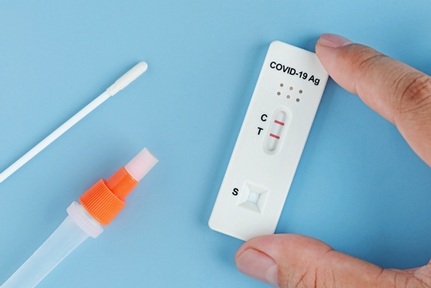Abandoning self-isolation rule puts immunocompromised people at risk, warn charities
A rule to self-isolate after testing positive for the virus could be abandoned by the end of February the prime minister has said, prompting charities to warn the lives of immunocompromised people are being put in "deadly" situations.

All of England's Covid restrictions had been due to expire on 24 March but Prime Minister Boris Johnson has told MPs that they could be lifted “a full month early”, subject to “encouraging trends in the data”.
During Wednesday's Prime Minister’s Questions, Mr Johnson said: "It is my intention to return on the first day after the half-term recess to present our strategy for living with Covid.
"Provided the current encouraging trends in the data continue, it is my expectation that we will be able to end the last domestic restrictions - including the legal requirement to self-isolate if you test positive - a full month early."
Mr Johnson told MPs he will announce the government's 'Living With Covid' strategy when Parliament returns from its recess on 21 February. According to the government, the law will be replaced with guidance that includes urging people not to go to work if they have Covid.
Scope: Some disabled could be placed in ‘deadly’ situations
While Covid vaccination protects most of the country's population, concerns have been raised for immunocompromised people who remain vulnerable to the virus with some feeling they have no choice but to isolate themselves from community for their own protection.
James Taylor from disability equality charity Scope, said: "Scrapping self-isolation will mean that some disabled people will be feeling very anxious and could potentially be placed in situations that could prove deadly.
"Nobody should be forced to gamble with their lives, and we need the government to explain to disabled people how they'll be safe when this decision is introduced."
Phillip Anderson, head of policy at the MS Society, said the PM’s move to abandon all restrictions including self-isolation, will place “yet more worry and confusion on thousands of immunocompromised people".
"In the face of callous silence from a government that should be focused on protecting them, they could feel forced to further isolate themselves from others, putting their wider health, wellbeing and livelihoods in danger."
'Some of us have been doing a strict lockdown for 2 years'
In response to the PM’s statement, a woman describing herself as immunocompromised on Twitter (@chronicallybee) posted: ‘Since some people genuinely don’t understand why immunocompromised and high risk people are freaked out and upset, i’ll explain!
‘You may be thinking “but you’re vaccinated.. you won’t get that sick” unfortunately, that’s not always true. i wish it was. some of us cannot get vaccinated because it’s dangerous with our allergies, our hyperactive immune systems, etc.
‘Some of us have impaired immune systems, so our immune systems don’t amount a good immune response and production of antibodies, the way that it does with a healthy person.
‘A lot of us really don’t leave the house at all besides groceries, work, etc.. some of us can’t even do that. the isolation you feel from only seeing friends every once in a while, and the few months you were on lockdown? some of us have been doing a strict lockdown for 2 years.
‘No family parties. no hanging out with friends. no dates at coffee shops, no movie nights, no trips to the theatre or the movies. and it’s not because we just have anxiety about getting COVID because it’s scary, it’s because some of can and will die from it.’
Responding to the PM’s statement, the MS Society posted on Twitter: “Removing these last remaining safety measures can only increase the risk of severely vulnerable people catching COVID-19.
“Government must address these concerns and ensure those eligible can access available treatments quickly if they get #COVID19. We also need more research into the use of these treatments and the general public encouraged to continue to practice infection control measures”.
Data from the Office for National Statistics suggests over one in 20 people in the UK had Covid in the week up to 5 February.
Latest News
 29-Jul-24
Dementia Bus gives carehome.co.uk staff insight into life with dementia
29-Jul-24
Dementia Bus gives carehome.co.uk staff insight into life with dementia
 27-Jul-23
UK's top home care agencies in 2023 revealed
27-Jul-23
UK's top home care agencies in 2023 revealed
 30-Nov-22
A quarter of older people keep their falls secret from family
30-Nov-22
A quarter of older people keep their falls secret from family
 29-Nov-22
'Covid-19 has not gone away' say terminally ill
29-Nov-22
'Covid-19 has not gone away' say terminally ill
 28-Nov-22
IT consultant who received poor care opens 'compassionate' home care business
28-Nov-22
IT consultant who received poor care opens 'compassionate' home care business